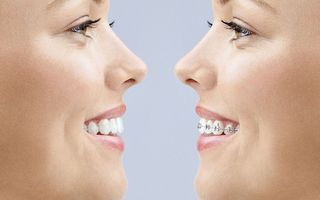
Invisalign®
The clear alternative to metal braces.
Having a friendly photogenic smile can help to improve your self-esteem, confidence, and overall appearance. If you're afraid to smile because of crooked teeth, Invisalign® can help.
Invisalign has revolutionised the field of orthodontics, allowing patients to straighten their teeth without the need for traditional braces. If you're looking for a more comfortable and flexible alternative to metal braces, Invisalign could be the solution for you.
What is Invisalign®?
Invisalign treatment involves a series of custom-made clear aligners that gently shift your teeth to their desired position. These aligners are created using advanced 3D computer imaging, enabling your dentist to plan the precise movement of your teeth for optimal results.
Every few weeks, your dentist will give you a new set of aligners that correspond with the movement of your teeth, ensuring continuous progress throughout the treatment process.

Invisalign® in 3 simple steps
Step 1: Invisalign Consultation
Our experienced cosmetic dentists are here to help you achieve your dream smile with Invisalign treatment. During your consultation, they'll take the time to understand your goals and carefully observe how you smile, speak, and bite to assess if Invisalign is the right fit for you. This is an opportunity for you to discuss your smile goals and any specific requirements.
Working together, they'll create a personalised treatment plan that's exclusively designed for you, ensuring you receive the best possible results.
Step 2: 3D Scanning & Imaging
After confirming your suitability for Invisalign treatment, your dentist will conduct detailed 3D scans of your teeth using an Itero or digital scanner.
These scans are used to design and create custom aligners, bringing you closer to achieving your desired straight smile. Using our advanced state-of-the-art technology, we provide a preview of your predicted result; allowing you to suggest any desired changes.
Step 3: Wearing Your Aligners
Once your custom aligners from Invisalign are ready, you can begin your treatment! Your Dentist may need to put some small tooth-coloured blobs on your teeth called “attachments” to help move the teeth. They are easily removed once treatment is complete. Ask your Dentist if these will be necessary for your treatment.
Sometimes we may also need to make some space between your teeth to give them room to fit, this is called “interproximal reduction” or IPR, this process is painless and doesn’t damage the teeth.
We'll provide you with your initial set of aligners and schedule regular check-ups every 6-8 weeks throughout your treatment where we'll monitor your progress and make any necessary adjustments. The total duration of treatment varies depending on individual cases, but on average, Invisalign treatment typically lasts between 12 to 18 months.
How does Invisalign® work?
Invisalign treatment begins with a consultation where your dental professional will use specialist technology to scan your teeth and show you a visualisation of what Invisalign could do for your smile.
Should you choose to go ahead, your dentist will use the scans of your teeth to create a series of aligners that you will wear for at least 22 hours per day during your treatment.
Every few weeks, you will switch to the next aligner in the series, slowly moving your teeth into a straighter, more aligned position, and working your way towards the final aligner and the smile you’ve always envisioned having.
Throughout this time, you will have regular check-ins with your dentist or orthodontist to assess your progress.

Once your teeth are in their final position, you will switch to a retainer that will ensure your teeth remain in place and do not move back to their original positions.
How much does Invisalign® cost?
It will depend on how many aligners you will need to reach your oral health goals, how complex the changes are, and how many appointments and adjustments you need with your dentist or orthodontist.
The cost of dental care shouldn’t be a barrier to getting the treatment you need. With our exclusive payment plan, SmileFund, you can spread the cost of your care over time, interest-free. Some of your Invisalign costs may also be covered by dental insurance, so be sure to check with your provider.
The benefits of Invisalign®
- Aesthetics: The most noticeable advantage of Invisalign is its virtually invisible appearance. Unlike traditional braces, Invisalign aligners are discreet and barely noticeable, allowing you to maintain your confidence and smile throughout the treatment process.
- Comfort: Invisalign aligners are made of smooth plastic, eliminating the discomfort often associated with metal brackets and wires. They are custom-designed to fit snugly over your teeth, providing a comfortable orthodontic experience.
- Removable: Unlike braces, Invisalign aligners are removable. This means you can take them out when eating, drinking, brushing, and flossing, allowing you to maintain good oral hygiene throughout your treatment.
- Convenience: With Invisalign, you will spend less time in the dental office compared to traditional braces. Appointments for adjustments are typically scheduled every 4 to 6 weeks, giving you more time to focus on your daily activities.
- Self-Confidence: We understand the negative impact on your confidence that having a crooked or irregular smile can have. Invisalign ensures that your smile is straightened, your teeth are aligned, and your smile is relatively beautiful.
Are you looking to straighten your smile? Discover if Invisalign is the right choice for you and begin your journey towards your ideal smile.
Get in touch with our friendly team to schedule an appointment.
Frequently asked questions
National Dental Care understands that teenagers can be self-conscious about their smiles. Teenagers can enjoy a beautiful smile thanks to a product called Invisalign® Teen.
Your Dentist may have small indicators on each aligner that gradually change from blue to clear to remind teenagers they are approaching the end of their wear time.
There are also several free replacement aligners included in case one gets lost or misplaced.
Yes, you can. More adults have turned to orthodontic treatments such as Invisalign® to improve their smiles. You may be a good candidate if you aren’t satisfied with your smile or are experiencing dental issues such as malocclusion or crowding. Invisalign® can help restore teeth to their proper place.
Invisalign® is neither better nor worse than braces when it comes to results, but the method is different. You may find you prefer the benefits of Invisalign®, such as being able to remove the tray for meals and how discreet they are, so it may be a better choice for you personally.
Your dentist will inform you if your oral health would benefit from orthodontic treatment. This is usually the case if your teeth are crowded, misaligned, or have other spacing issues. However, even if your oral health is perfectly fine, you can still opt for orthodontic treatment if you feel that straighter teeth would boost your confidence.
The cost of Invisalign® depends on a number of factors, such as how complicated the work is and how many aligners you will need.
This depends entirely on your health insurance. Full dental extras will likely cover some of the cost of Invisalign. However, entry-level insurance will likely not cover Invisalign treatments at all, so be sure to check with your health insurance provider to understand what you're covered for.
Yes, Invisalign® results are permanent. You will need to wear your retainer after treatment has finished to ensure your teeth do not move back into their original positions.
Once you stop wearing your retainer (on your orthodontist’s advice), your teeth may move very slightly, but will remain straight and aligned permanently.

